#negative utilitarianism
Text
Gentle reminder that ethics isn't a popularity contest and you shouldn't base your views on whatever it is that the people around you believe and approve of. Also, normal and commonplace does not necessarily equal morally good and weird and fringe does not necessarily equal morally bad.
#random thoughts#general#morality#ethics#atheism#anti religion#veganism#right to die#gay rights#anti capitalism#restorative justice#acab#antinatalism#radical feminism#radblr#negative utilitarianism#luna's
46 notes
·
View notes
Text

9 notes
·
View notes
Text
wish i had someone to mansplain the trolley problem to rn
#i know u all wanna think ur utilitarians but i PROMISE if i reframed the situation u would ALLL be deontologists#negative moral imperative to do no harm outweighs positive moral imperative to prevent harm in most cases#but when there's a lever involved and no direct physical contact u can trick urself into thinking u arent the one causing harm#rest assured. u are#anyway theres no correct moral solution to the problem but i just wanna TALK about it .. ☹️☹️#hello world
6 notes
·
View notes
Text
it is not just local politics that are an argument between 'pay now (but less)' and 'pay gradually and later (but more)' but i'm. gonna focus my energy where i think it may have an impact
#unfortunately i believe that safe and secure people add more value to society than it costs to Make them safe and secure#but feels like the idea of anything other than a Personal Failure causing a negative impact on productivity is seen as? liberal propaganda?#preventative care is cheaper than emergency care tho#and even from an entirely utilitarian perspective people who don't need emergency care get more done than people who do need emergency care#emergency care is hard on everyone!!#preventative care is preventative bc it Prevents emergency care!#and nutritious food is like. the Most basic foundation of preventative care#and then second is housing security#bc stress is fucking Bad for health!!!! and insecure (anything but especially) housing is fuckin stressful!!!#i think gradually and later ends up appealing because it's so much harder to quantify#until after. when it turns out it was Way More Expensive#storm's posts#personal#you can ignore this#i think there is still one more coming but i gotta remember what it is#that'll happen at some point but if it's not in the next few hours i'll probably sober up enough to get anxious about posting it
2 notes
·
View notes
Text
While in general I don’t respect people who claim that things were so much better in the past I do make an exception for negative utilitarians who make that claim
If you take negative utilitarianism as true the world really is a worse place nowadays! I can’t deny that that’s true
#because of the higher population#I guess technically if you were an average negative utilitarian then this doesn’t apply#But average utilitarianism is even more stupid than negative utilitarianism#So I like already doubly don’t respect average negative utilitarians anyway
1 note
·
View note
Text
how do philosophers do it. do they receive grants to stare out a window and then write the most batshit and impossible solutions to problems that they made up
1 note
·
View note
Text

"...?" And then, seemingly as if she's trying to test how flat a human could possibly speak: "Of course I have drip."
She's a waterbender, after all.
#ic // sasume#v: crack#about // sasume#open // sasume#spoiler: thats arguably relevant bc the post-combat cleanup etc enabled by liquid bending#is prolly why any of her clothes are at all wearable lmAO#i shuld make a proper hc post abt it tbh...#(her clothes + behavior towards them that is. not her drip she doesnt have any :) )#she may not have any NEGATIVE drip btwn her own looks and not having BAD taste in clothes#but theres also... not much of anything there... yk... lol#the skin tight sleeveless turtleneck + sleeveless gloves may be A Look but those r her standard inner layer#w her actual VISIBLE clothes just being. well. maybe some overshirts and just a utilitarian basic jacket#(formerly heavyduty but now p worn down yk)#open //
0 notes
Text
Even in a purely, coldly utilitarian moral system, there are three questions to ask before accepting harmful or destructive Means because they ostensibly lead to a better End:
Do the Means lead to some other negative End, in addition to the intended one? The classical example of the naïve utilitarian doctor who kills a patient in order to harvest their organs and save five patients, in practice, if accepted, leads to general loss of trust in doctors and hospitals and therefore to much greater loss of life; hence, doctors should follow a hard rule of not killing patients to harvest their organs, even if this might save more lives in the shortest term.
Are the Means necessary in order to achieve the End? The negative utility of atrocious Means still ends up in the final account along with the supposed positive utility of the End (and without the penalty for uncertainty that the latter should arguably be given). The Means are as much part of the final state as the End.
Do the Means, in fact, lead to the End? Any consequentialist justification for an atrocity-for-the-greater-good automatically fails if the atrocity does not plausibly bring out the greater good, even before any other consideration is taken. It's all well and good to say that you can't make an omelette without breaking eggs, but (ignoring for the moment that people are arguably owed more consideration than eggs) a large chunk of the 20th century was a sustained and furious festival of egg-crushing and egg-trampling that resulted in precisely zero omelettes.
2K notes
·
View notes
Text
Always an experience watching the leftism leave FNAF fans when someone mentions that Scott Cawthon financially backed fascist politicians.
The switch from posting hardline leftist tweets about boycotts and signal boosts and critical takedowns of politicians and celebrities to ‘ohhh, well. everyone makes mistakes. who can blame him, listen he. he donated money to gay charities too. that makes it ok! a millionaire in his forties is allowed to have political beliefs. does it even matter? just let it go!’ is whiplash inducing. The antivaxxer celebrities have got to go, but this one horror dev who quietly handed wads of cash to antivax lawmakers? He’s chill, he can stay.
The charity thing is so funny too because suddenly utilitarian positive-negative point counting is the way to go. Maybe an abacus would help calculate the net good of donating to the Trevor Project minus donating thousands of dollars to Mitch McConnell and Donald Trump. -10 points if I push a kid in a lake but +11 points if I help an old lady across the street, so I’m chill. You can’t judge me. Hey, maybe. Just don’t push a kid in the lake period. How fucking low is the bar when we’re excusing maxing out the possible dollar amount of donations to Mitch fucking McConnell. That should be like. Default you’re a bad person.
#delete later#personal#not art#rant#you can still be a fan of fnaf 100% but god you’re not obligated to defend its creator#don’t pretend like Scott is cool#“’Scott likes gay people he only voted for trump for his fiscal and defense policies in defendi america from terrorists!’#kid. that’s not good either.#fiscal conservatism kills people too.#the whole thing exposes how weak some leftists are to the image of the ‘well-mannered right wing republican.’ the type who would#respectfully disagree with your right to exist with a kind top of the hat#‘as long as you silently hate me and force a nice smile while shaking my hand it’s ok’#this is why jk Rowling is hated while Scott gets a free pass. just have to hide your hate well enough and liberals will excuse you ig
3K notes
·
View notes
Text
One of the fundamental aspects that helps carry Bocchi as such a genuine article is that Bocchi herself is at neither extreme of the competence scale.
In a lot of these “Main Character has immense insecurity issues and social anxiety”, you have a main character that REALLY doesn’t have anything going for them except their ‘pure heart’ (they are kind to others and that’s it) or they are actually a huge wellspring of untapped potential that just needs that little extra push in order to flourish.
There’s positive messages to be gleaned from these, for sure, like “sometimes being yourself is enough” and “you are so incredible, you just don’t know it, you can do anything”, which, while definitely something that can be That Event or Realization that helps someone overcome something, I think ultimately fails to account for the, perhaps, more worldly, more realists out there that don’t need to hear that for the one hundredth time, because the previous ninety nine times didn’t really do it for them, kind of how like “fake it till you make it” works for a lot of people, but also doesn’t for a lot of others.
If anything, I think one could glean something else from this: Unless I’m naturally a very kind person who’s always willing to put themselves down to get others over and can show genuine heartwarming kindness, or a genius waiting to bloom, just so incredibly good and skilled at something or various things that that cements my worth, I’m shit out of luck. And let’s face it, extreme purity is more of a negative in the real world than a positive, because people will kind of just walk all over you if you let them, plus you’re likely not a lot of fun if all you got going for you is “I’m Nice :)” without something else to compliment it, like being funny, knowing interesting things, etc. On the other side of the table, it is ultimately a very utilitarian view to consider someone awkward, eccentric, and otherwise different likeable only because they are incredibly good at something or some things, a Rudolf the Reindeer situation where his red nose makes him an ostracized freak right up until it’s actually useful for others and has a practical application.
It’s here where I think Bocchi subtly nails it: She’s at neither end of the stick. Bocchi’s only real skill to speak of is that she’s good at playing the guitar, but that’s because she’s actually been diligently playing for years now, has a successful ‘Tube channel, and explicitly enjoys playing the guitar both as a hobby and as a pressure valve; one of the early gags is that when overwhelmed with negative thoughts, she’d channel that right into composing a melody to play with her guitar, which she abandons after a few episodes when she’s a bit more comfortable with the people around her. Besides that, it’s explicit that Bocchi isn’t particularly good at other things, and we know she’s kind of ‘creepy’ in the endearing, eager way, the photos thing with her room being less that she’s a maniac and more that she’s very very stoked to have friends, for example, which she then reigns in when her mom tells her “hey, sweetie, that ain’t it”.
Everything Bocchi does is ultimately very consistent with who she is presented to be: She doesn’t just magically do a 180 turn just because she’s technically doing everything she set out to do, Bocchi is still a naturally anxious, negative person, and that’s fine, and her friends aren’t oblivious to her being like this (the gang being oblivious to the MC’s anxiety is a recurring thing in the genre!), in fact, they are fully aware and many times they say “oh is Bocchi having a Moment again?” or “ok I know where to find her, we need to look in a place where creatures like Bocchi, such as slugs, can be found”, they are fully aware that Bocchi is like that, but they like her anyways because, much like the audience, they think she’s fun to be around. Her being a good guitarist isn’t even why they stick by her, since she was actually bad at playing guitar with a band initially, only adjusting later, but even during this period before she adjusted, the rest of the band is like “oh no yeah this our guitarist Bocchi and we love her, she turns into a creature now and then and gets attacked by birds for no reason and it’s really funny, we’re going to store love in her”.
Bocchi isn’t exceptional in either a pathetic or successful way, she’s just Bocchi and she has friends that she likes and that she likes, and in the end it’s not really about “fixing” her as much as it is just making the band work out and having a good time while seeing that through. The only ones you could say are out to truly make sure Bocchi has a great opinion of herself are Kita and Kikuri, the former because that’s just how she is, and given how loving she is, she would like for Bocchi to see herself as someone actually cool and funny, the way she sees her, and the latter because Kikuri herself used to be pretty negative and never really got through it properly, relying on heavy alcohol binging instead to get in a good state of mind, and initially really wanted Bocchi to just enjoy playing music as an artform regardless of her skill.
All of this helps the dynamics feel not like we’re supposed to be backing a bland MC that is less a main character and more a vehicle to see the cooler rest of the cast, not like a Rudolf the Reindeer situation, but instead, helps it feel like we’re just seeing people that like being friends, being friends and hyping each other up or messing with each other because that’s what pals do.
2K notes
·
View notes
Text
The thing about 9/11 especially is that the thing that prevented another 9/11 from happening was 1) locking the cockpit door on airliners and 2) passengers realizing that if hijackers took over a plane they might die. Nothing the US did as a matter of military or foreign policy in the immediate aftermath mattered one bit, except in a negative direction. Indeed, when the US was in a position to capture bin Laden in Afghanistan they flubbed it—they wouldn’t kill him until years later, in Pakistan, in the kind of operation that didn’t require occupying a whole country.
Even from a totally ruthless utilitarian perspective, militarized responses to terrorism are a huge waste of money and life.
310 notes
·
View notes
Text
Nature is not your friend.
Nature is a not a force of benevolence. It does not think, it does not feel, it does not want. It is incapable of caring about the wellbeing of any living creature. It is not inherently good. An inherently good thing would necessarily either be inherently good in character, which nature cannot be because it is not a conscious being, or inherently good in what it does, the effects it has on the world, which nature is clearly not.
The evils born from human action are not separate from nature. They are a part of nature. They are examples of how the evils of nature manifest. Humans do not exist outside of nature. We are just as much a part and product of it as any other creature, as objects even, as water and the moon. And while nature is not a conscious thing, it can and does cause immeasurable harm. It is evil because of this harm caused. Not in the way a man is evil, but in the way cancer is evil, in the way an earthquake taking hundreds of lives and leaving people trapped, injured, and starving for days is evil. Not evil as in a being who is morally corrupt, but evil as in a thing which generates injustice. A child who suffers the fate of dying horribly from disease is a victim of evil just as much as a child who is poisoned by another human is a victim of evil. True evil is in the experiencing of injustice, not in the deliberate creation of it. A victim of evil is created when a being is made to suffer. The nature of the perpetrator, what blame, of what kind, and to what extent, can be placed on it, is irrelevant. A victim is a victim whether they understand why they were harmed or not, whether they hate that which harmed them or not, whether they judge it or not, whether it can be held accountable or not, their pain is just as real and their suffering is just as unjust, just as wrong, just as unfair, just as undeserved, just as cruel, just as evil.
Whatever hate you hold in your heart for humanity, hold it too for nature, who imbued humanity with both the ability to experience harm and the ability to inflict it. Who gave humanity its impulses, its urges, its instincts, prejudices, and perversions. Whatever sympathy you feel for animals who are made to suffer through human action, feel it too for the animals who suffer independently of the influence of humanity, who succumb to torturous diseases, broken limbs and open wounds, tape worms and bot flies, and deformities which render them incompatible with survival from their very birth.
To detest evil is to detest nature itself. To love nature is to dismiss its evils as not truly evil, to dismiss suffering as not truly unjust. To love goodness is to love happiness, joy, and pleasure, to love what of these things can be felt, created, spread, and preserved. But there is no loving of goodness in the love of nature. If nature can be, and often is, seen as good through the good it births, regardless of its status as a mere force, then it can be seen as evil through its creation of evil as well. And just as we would not consider a person who committed uncountable horrible acts to be redeemable through any number of good ones, we should not see the good that nature creates as capable of excusing or justifying its innumerable works of evil, which include amongst them all the evils of humanity.
#antinatalism#efilism#pessimism#anti suffering#negative utilitarianism#determinism#rant#rambling#I know I sound kind of pretentious here I'm sorry this is just how I write#luna's
45 notes
·
View notes
Photo

2 notes
·
View notes
Text
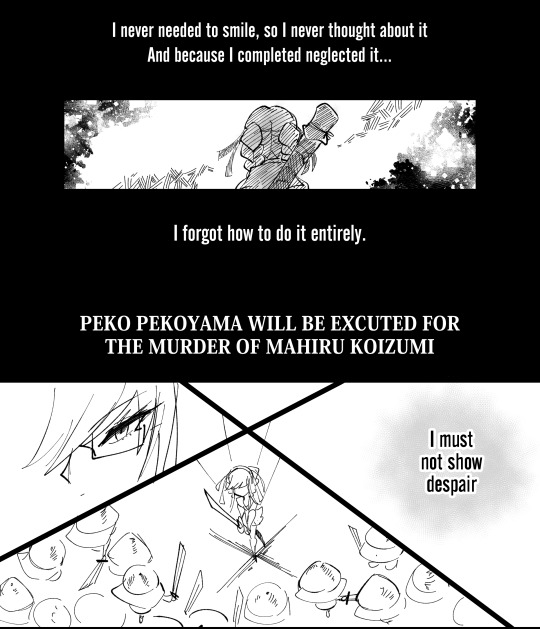
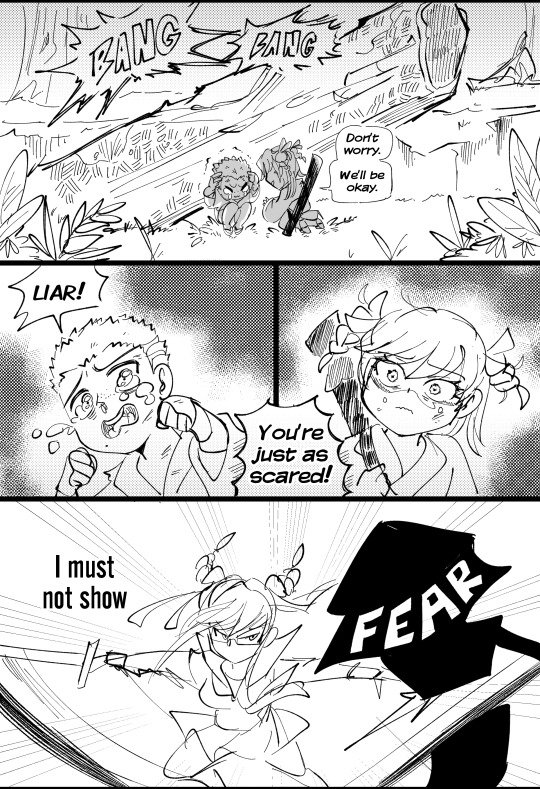
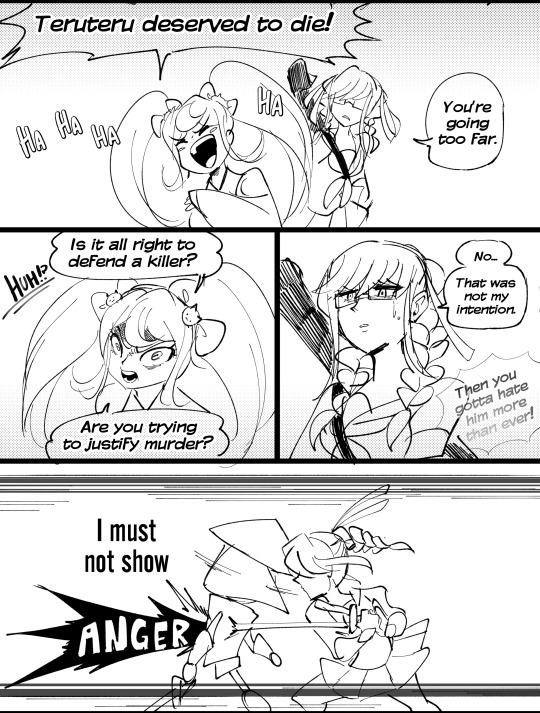
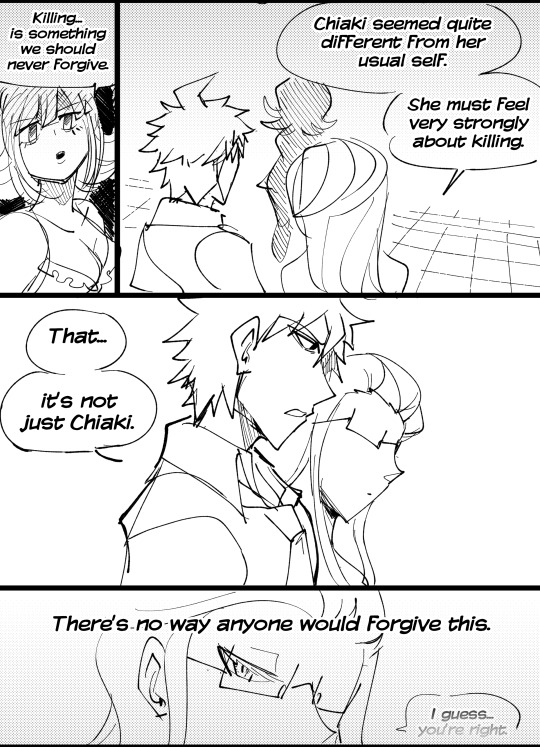
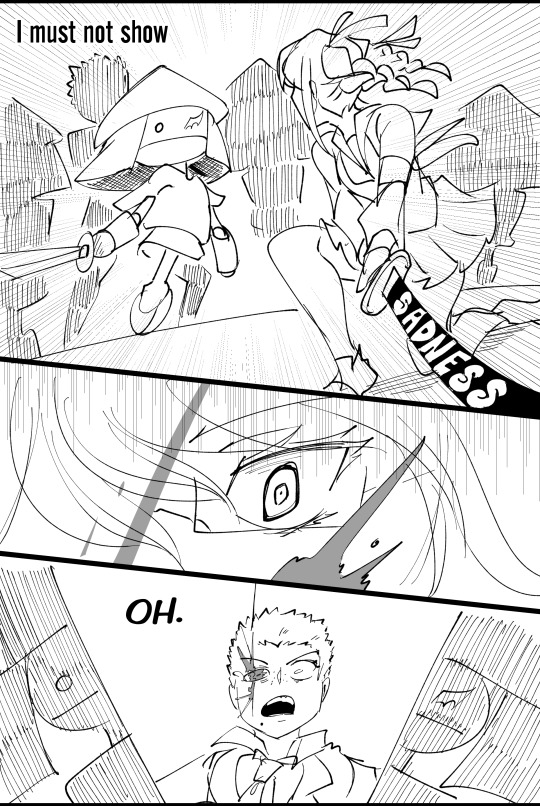
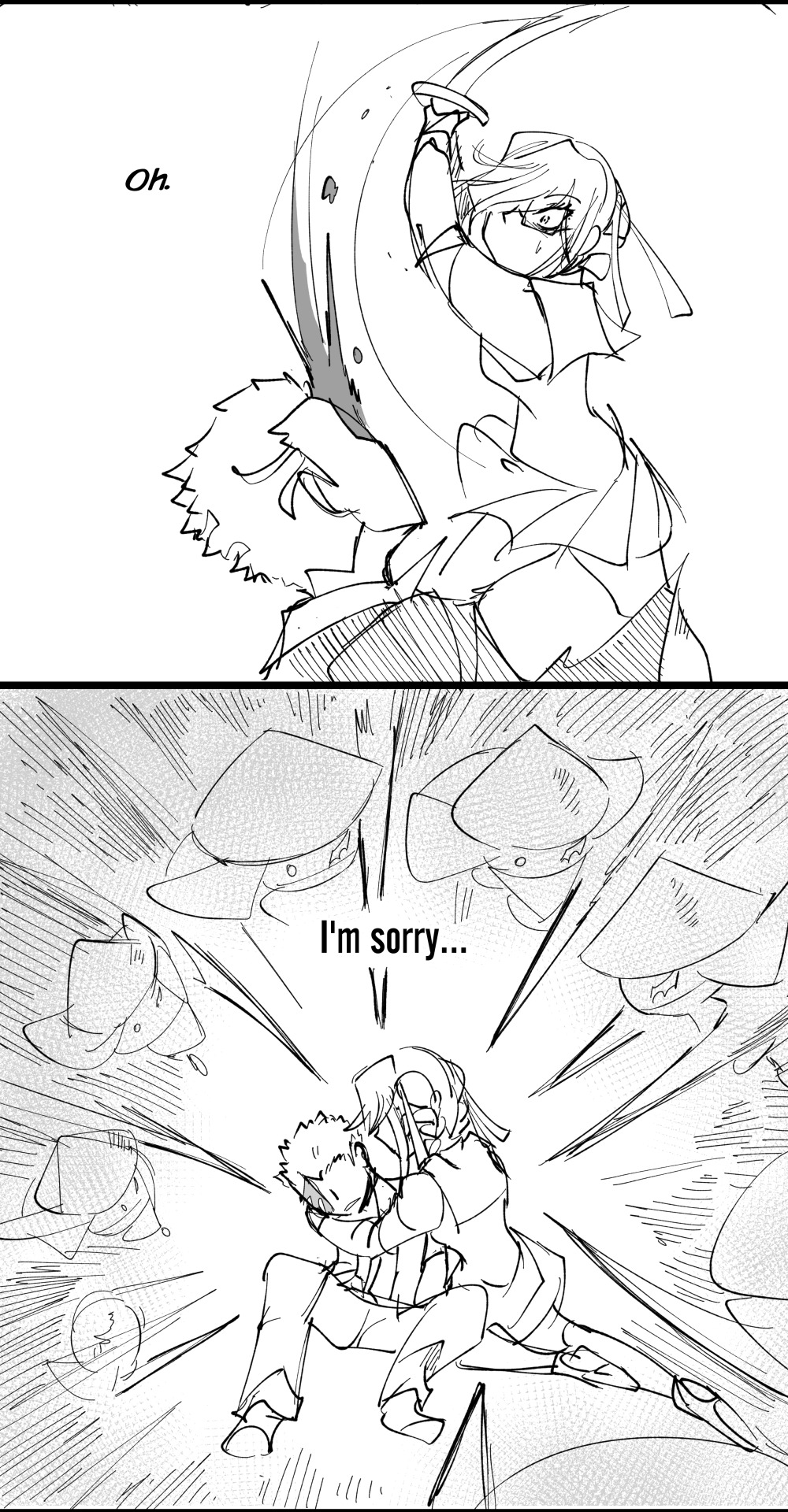
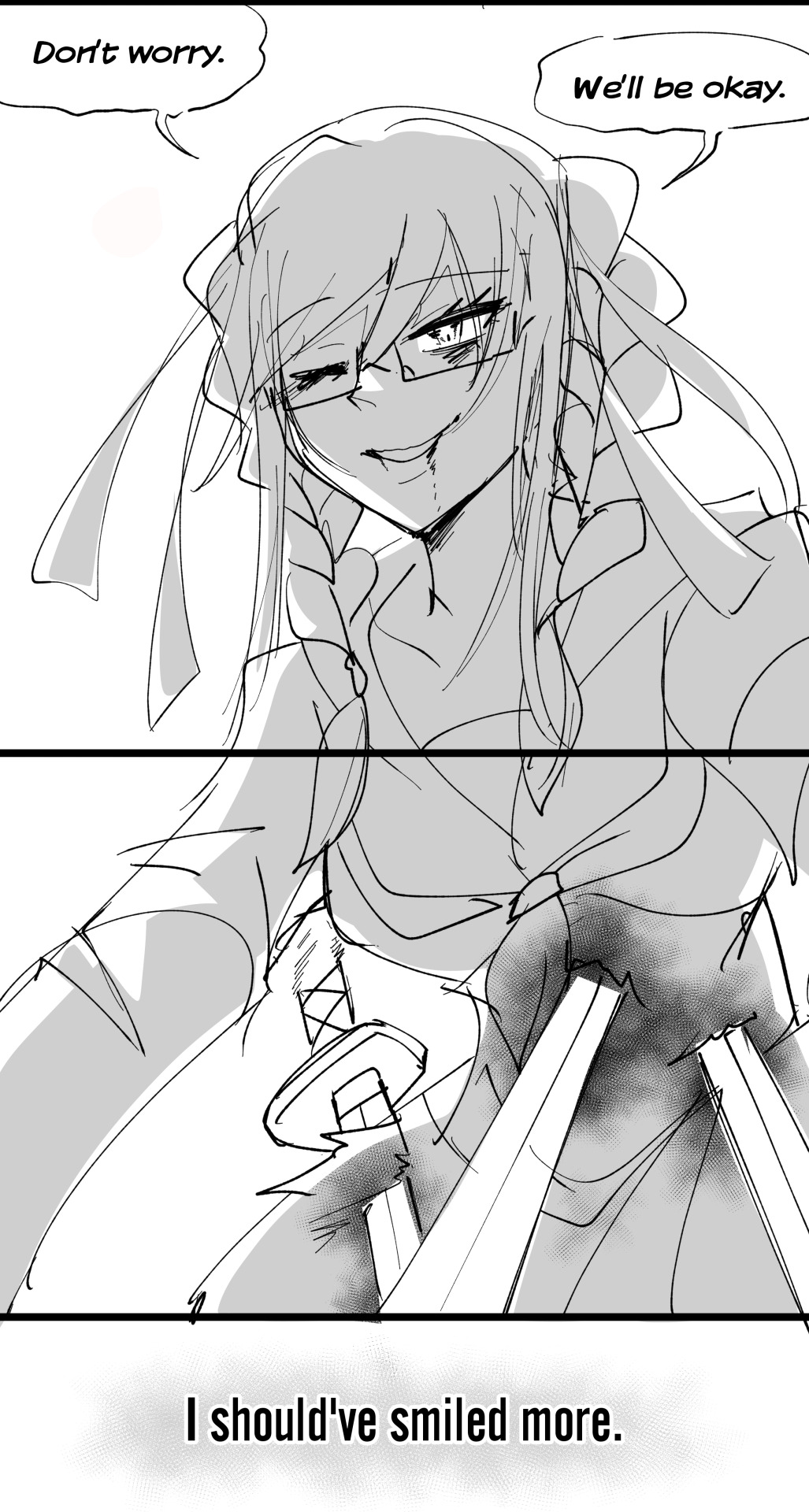
"Stoic Peko"
Read Left to Right
Misc Notes:
1) The Hiyoko and Hajime sections are verbatim from the game. Peko had to agree with her classmates TWICE that murderers deserves no sympathy
2) I don't like it when people jump to idea that Peko had her emotions beaten out of her by the Kuzuryu Clan.
I think ppl take the "I had no reason to smile" to literally and think she had a miserable childhood. But she talks about going to the zoo, carousel, etc; Peko has good childhood memories. She just didn't need to smile during it. Another example of why "Peko had no reason to smile means she was never happy" doesn't work is because she does get happy when she sees fluffy animals! And the girl still can't give a decent smile!
I think the line is supposed to reflect Peko's utilitarian upbringing. It's not that Peko was never happy but expressing her emotions was never useful as a tool. To be more specific: I think Peko had to shut down all her negative emotions serve her purpose as a tool and it just extended to all emotions.
Don't get me wrong, I do think Peko had an abusive past but I don't like it when people go to the extremes.
3) It is my strong headcanon that the last thing Fuyuhiko saw was Peko's smiling face before he passed out during Peko's execution. It fits in very well with Peko's freetime: wishing she smiled during their kidnapping to comfort Fuyuhiko
301 notes
·
View notes
Text
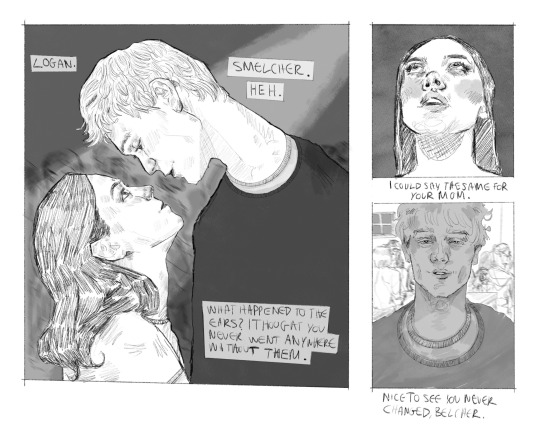
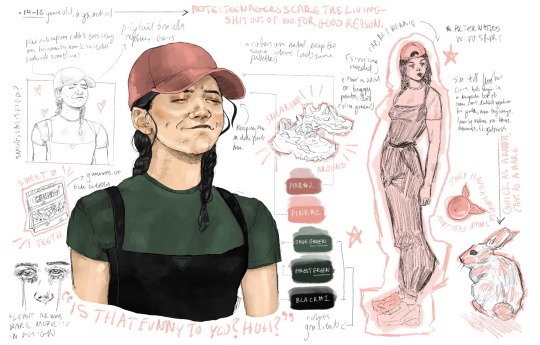
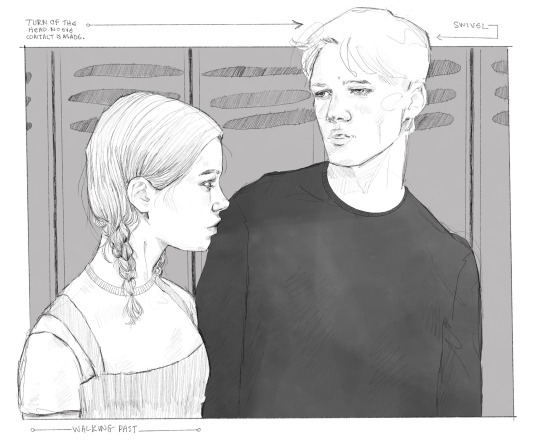
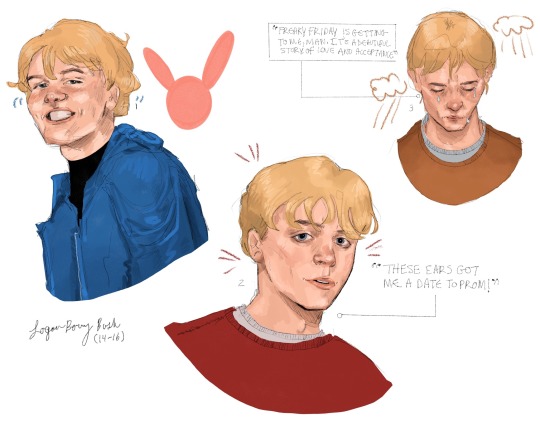
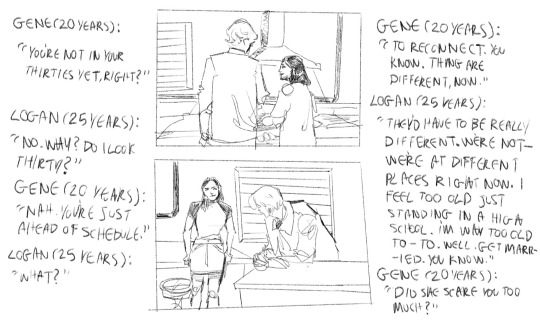
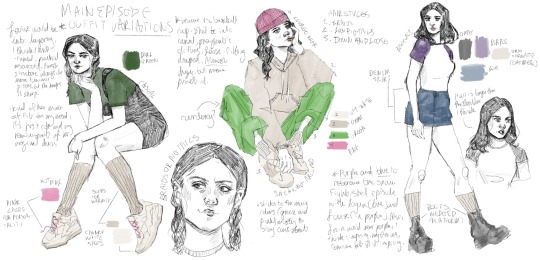
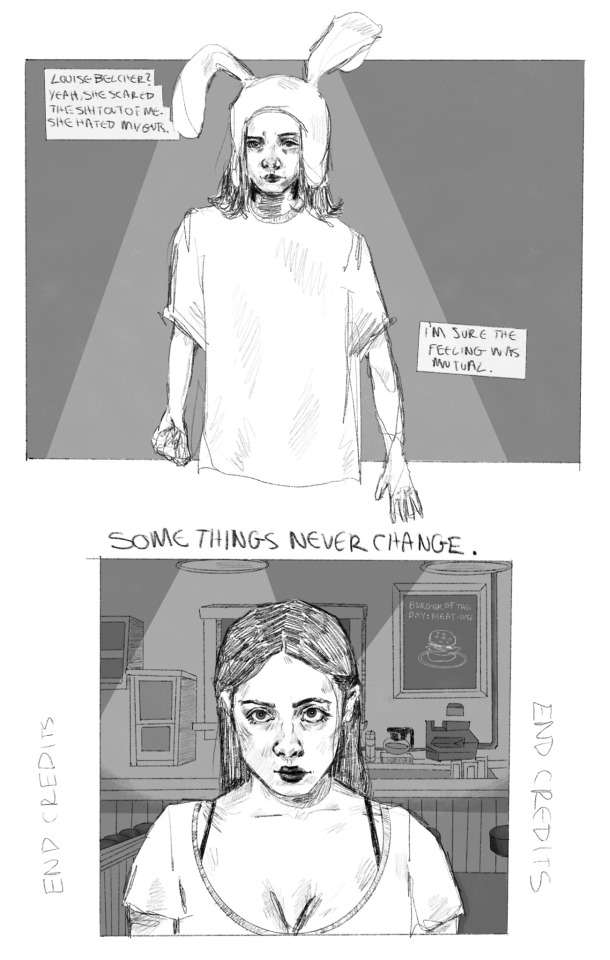
growing pains
It’s only been nine years. They’re not in their thirties yet—and won’t be for a while—but it’s worth noting that things are different. Maybe it’s them, maybe it’s the boardwalk, or maybe—well. Logan is a different person than when he was a high schooler. He’s less assured than he was. That could be it. Louise is almost certainly different than she was then, but even now she still hates his guts. Maybe some things don’t change after all.
Notes Transcription
Main Episode Outfit Variations
Louise would be into layering, I think. She’s multifaceted, practical, and resourceful. Harsh structure in conjunction with more layered pieces; tendency towards color blocking, but she keeps it sharp. She’d be into casual, pragmatic clothes. If not very structured, she has loose-fitting, draped fabrics like sweatshirts or heavy pants (cargo material, corduroy, denim?)—draped and bulked, but not baggy. Something easy to run and move in; sneakers or combat boots.
Not opposed to dresses. Keeps it compact, simple lines. No frills but does lean into triangle shapes or rectangular blocks. Color blocking => neutrals will take up negative space, highlight colors are accented.
Sticks to main colors (green and pink) for consistency, but relies on neutrals like beige, black, and brown. Less cool-toned than Tina, either spring or autumn coloring. Bright colors are muted with exception of a highlight, usually pink (hat or laces). Green varies from lime to olive to sage to forest, etc. whichever tone is appropriate.
Occasional purple or blue in reference to the snowball fight/sled episode with Logan (he was in blue, Louise was in purple). Louise could lean into purple (imposing, mysterious, feminine but still intimidating) for off-episodes. Not frequent, though; too similar to Tina’s color palette.
Hairstyle options include braids, pigtails, or just loose. I’m growing partial to braids; they feel utilitarian, almost boyish, useful. Could emulate the bunny ears under the cap.
Beanie vs. Baseball Cap. I like the beanie, but to me it lends to this aspect of laziness? Not the worst, but i like the structure and sharpness of the baseball cap. Also obscures the eyes occasionally, or could be worn backwards.
Timeline + Basis
Loosely, 9 years post-canon timeline (ambiguous). Louise is 18, Logan is 25. The age gap is too big for them to feasibly be in high school together, so the second storyboard shot by the lockers is him visiting the high school for some errand (maybe Cynthia needs him to deliver something, maybe he’s got a younger sibling by now?), Louise passes by him in the hallway and doesn’t move to accommodate him (almost slams into his shoulder) and he almost looks back at her but continues on. He recognizes her when he visits the diner, which he later frequents because it’s one of the closest places in town that has good food that’s affordable and keeps him out of the house.
That’s one of the reasons, anyway. He isn’t conscious of it, although Gene picks up on it early on an often gloats to either Louise or Logan, both of whom are baffled or irritated at first. Linda is overly supportive of the idea to the point of humiliation, Bob doesn’t want to think about it and refuses to see it, and Tina writes extremely detailed romance novel drafts about it.
Logan becomes ‘aware’ in the following year, then feels really gross about it and avoids the diner for months until confronted (member of the family is up for debate). Realistically, nothing ‘tangible’ happens between them for three years (kiss? Weird face touch? Jealous outburst? Freudian slip? Something fun, idk [Louise: 22, Logan 29]).
I think Louise regresses at this point, and tries to distance herself like that episode of iCarly when Sam realizes she’s in love with Freddy and literally institutionalizes herself in a mental ward. Very much LALALALALALALALALA I can’t hear you, that didn’t happen. Logan is not feeling great at this point. Heart-to-heart with Bob snaps her out of it.
One more year of slow burn, actual relationship starts (Louise: 23, Logan 30).
Logan gets married, eventually, in his early thirties. Gene is an unintentional omnipresent narrator.
Additional Notes
Keep Logan in primary colors (mostly red or blue), but keep him out of dark neutrals/monotones (no black or charcoal gray), because it’s too heavy of a countermeasure against Louise’s color blocking—too unbalanced.
Decent height difference, although it varies depending on Louise’s shoes (sneakers or platform boots, she’s usually in sneakers in the restaurant). She’s right over his shoulder (?)
Concept comparison of them both around the ages 14-16 are for comparison only. Their ages do not coincide.
Occasional pet names, always mockingly derogatory.
Montage shots of her leaning over the counter while they talk. He used to sit in the booth seats but eventually began sitting at the counter instead. No reason. It means he can talk to her more easily and bother her with less effort.
They’re the kind of couple who publicly argues over the pronunciation of ‘egg’ type beat. Bickering keeps it exciting for them, but they make it a point to apologize in any serious disagreements, usually by the end of the episode. Similar difficulty in admitting when they’re wrong, often attempt to compromise by sharing/taking on blame in some equal capacity. Sometimes this is healthy, sometimes it’s more de-facto.
Mother-in-law beef goes crazy
#louigan#bobs burgers#louise belcher#louise x logan#logan bush#basically logan visits hometown after living some life and getting his education. it’s a little under a decade later and he likes to think#he’s changed for the better#but seeing his childhood home has changed so much unsettles him somehow. at least his archnemesis still hates his guts#for now anyway. gene hasn’t forgotten about his reduction from he was eleven. sure the timings off#but Logan and Louise are going to reconnect and then get married. they’re just a little ahead of a schedule it looks like#my art
112 notes
·
View notes
Text
A Not So Brief Analysis Of Dracule Mihawk
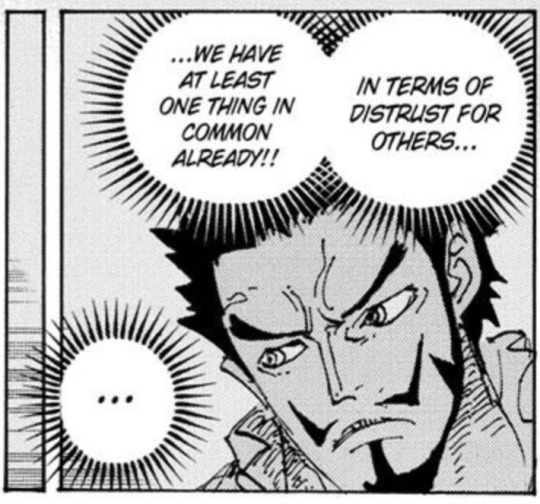
Wondering if Mihawk's distrust of others correlates with the fact he is basically a one-man crew. Wondering just how self-reliable he must've become in order to be self-sufficient. Wondering what is the cause behind it all.
I wonder if, similarly, he has trouble being vulnerable around others. There is an undeniably stoic attribute to his character, but there is a common pitfall practitioners of stoicism (or those who lean towards it) are susceptible to: emotional disregard under the guise of control of emotions, or even worse, reprimanding empathy.
Therefore, could it be the case Mihawk is emotionally detached? It would be easy to draw such a conclusion with what little we’ve been shown of him. While an individualist, he accepts those who come to/at him (Zoro and Perona), and he reaches out to others (Shanks); it might be true that he’d lost interest in Shanks after his injury, but he still committed the sweet act of showing him Luffy’s bounty and apologizing to him upon testing Luffy. There’s also the moment where he tells Perona to take care, upon her departure. So, while aloof, Mihawk is not reserved to the point of stoic cold. He wouldn’t sacrifice company in order to be alone (even if in the case of his pact with Crocodile, there was an utilitarian aspect to the choice; in keeping Perona and Zoro, and in visiting Shanks, there was none other than being nice). One could attribute these acts to an emotional attachment because it does take a drive to complete these very active feats. For Shanks, it could be respect, too. I don’t believe the detached attitude Mihawk possesses would let him take care of those two for two years, especially since he values peace so much; something had to override this desire for peace. I say, the reason could be empathetic in its roots.
Perhaps his self-reliance is misread as distrust? To distrust someone would imply that one is uncertain of their motivations/actions. Mihawk, as someone with Observation Haki, someone who views his enemies with curiosity, who allies himself with whoever is willing to offer him the most peaceful residence… would he be so distrusting? In the little glimpses of his internal monologue we get, there is no distrust and no hesitation. In general, he is confident in his judgement.
But on a more personal level, does he fear his more delicate feelings would be betrayed, if shown too much? There is a possibility for that. We haven’t seen him in such state, as he does rely on himself only. Perhaps Crocodile knows of it. On the flipside, this would imply that Mihawk has a deep, unburied emotional core, one he nurtures and protects – and perhaps one that was taken advantage of. Observation Haki can’t save him from heartbreak, can it? It can sense the emotions of others. It can’t predict his own.
In either case, there very likely is a softer core to the world’s strongest swordsman. Establishing that he isn’t emotionally exempt, but knowing that there’s still a strong individualist quality to him, I wish to look at more of Mihawk’s internal processing.
For an arguably isolated character, he isn't close-minded at all. He possesses curiosity towards his foes; he asks, and he indulges, and he encourages. Think of the entirety of his fight with Zoro.
Then, later on, he is more than anything amused at Zoro’s request. But he obliges. Have the rare panel where he laughs.
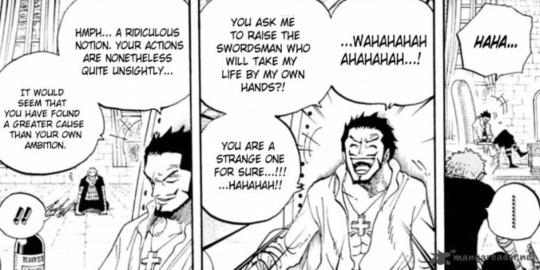
When he assesses the strengths of his opponents, he doesn’t do so with any negativity in his mind. Oddly, he goes great lengths to assess them (thinking of his encounter with Luffy). Imagine, it was worth disturbing his peace! Linked here are several reasons why he might’ve done so.
One thing all of these cases have in common is ease. One could argue that it stems from absolute confidence that he is unbeatable, therefore he acts out of boredom, but then again… he trains Zoro because he recognizes valiant traits in him, not because he has nothing better to do. While, yes, there might be some boredom in his life...
Could boredom be Mihawk’s internal motivator? Can we classify his actions as so random/pointless that they serve a sort of entertainment to his otherwise dull living? Personally, I don’t gravitate towards that take. He actively works to preserve his ‘boring’ way of life. For a man so unimpressed, he isn’t trying to change himself at all – nor his routine, not much – in order to appease any need for excitement. The only time he expresses he feels excitement is when trouble heads his way. He does not seek it. Therefore, I presume he is content with the way things are. Quiet.

How does one pinpoint and rationalize these very complex stances? It could be summarized as the opposite of what Mihawk told Zoro.

Could it be that the world’s strongest swordsman became one for he hasn’t developed himself merely in swordsmanship, but in wisdom of living as well? For his domain extends beyond the puddle. There’s an excellent post on Reddit that details the reference this entire phrase comes from, related to Zen.
In addition, I like that during training, Mihawk hasn’t pushed any ideologies or mantras on Zoro, beyond that of basic swordsmanship honor and shame. As far as we know, of course, but I argue such a lesson would be explicitly stated due to its importance. Anyway, these two do not have that moment. Mihawk gets closest to it with his ‘frog’ comment.
It could be assumed that, in not pushing any creed on Zoro (but that to expand his views), Mihawk is leaving room for Zoro to know himself beyond swordsmanship, while also respecting his dream.
Taking into account this ideological emptiness, the ‘frog’ comment, and Mihawk’s general disposition: confidence, ease, peace, I argue that they all stem from the fact Mihawk has found his place in life and has achieved his dream, doing it his way. Now, his current goal of sorts is to be outbested in terms of swordsmanship, a goal he is willing to help Zoro with.
And there is such honor and beauty to it! To sacrifice the goal of his life to help another person achieve theirs. Just how much at peace with themself would one have to be, to be able to give away so much of themself? It's mindblowing. Being able to dynamically balance so many internal and external factors (achieving a dream certainly isn't enough to teach or in any way emulate that; it takes vast wisdom to do so) to finally reach that stage of contentment: to let another have it, at the cost of your own, on a basis entirely factual and wholly fulfilling. It's once again reminiscent of stoicism, and its postulate that a life well-lived is one lived in accordance to nature. One lived in moderation. Now, Mihawk doesn't seem to be very emotionally expressive, does he?
In the aggressive tug-of-war that is the One Piece world, he remains steady, firm on his feet. He knows where he stands, and he’s where he wants to be.
Deeply in tune with himself like that, it could be interpreted that Mihawk has reached a state akin to ataraxia (Greek, meaning freedom of trouble or anxiety; tranquility of mind dependent on the mind), a viable path to one’s happiness as regarded in stoicism. Related, I find it very enjoyable that he is a character who has achieved his dream. Because one must ask: what comes after the dream is achieved? For Mihawk, there is simple contentment. Nothing ‘great’ after he’s reached his grand dream. Farming, napping, cooking, drinking wine, reading? How humble! Not much to indulge in, but he is fulfilled.
And so, his trail continues, he is aware of that, but he doesn’t chase happiness down it. And even if it gets rough and he has to deviate a little, he is on the right path. He knows it, and feels it. That's all that matters.
As Seneca said, “It is not that virtue is chosen because it pleases, but that, if chosen, it also pleases.” Mihawk delved into the wisdom of living, then chose his spot back in his own puddle, still occasionally gazing beyond it.
How exactly did Mihawk come to this mindset? Now that is mental work I reckon he deserves rest from.
#I am not too confident because I’ve known him for little over a week now#I’m also under the influence of alcohol a tad#so excuse my possibly wrong takes#I simply needed to yell about this man…#if I get him right#and if I get Shanks right one day#maybe I’ll write mishanks someday HAHA#dracule mihawk#mihawk#one piece#op#one piece live action#opla#zoro#dracule mihawk analysis#mihawk analysis
78 notes
·
View notes